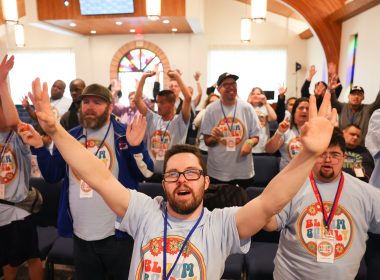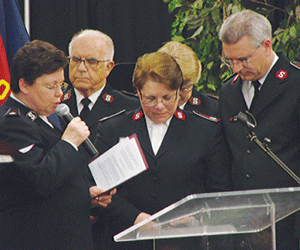 A Leadership Philosophy for the 21st Century
A Leadership Philosophy for the 21st Century
Lt. Colonel Richard Love
Divisional Commander,
Golden State Division
Having recently been asked about my philosophy of leadership by a newly appointed divisional commander, I offer the following as foundational tenets of a leadership philosophy for the 21st century.
An underlying tenet of a sound leadership philosophy is generosity.
It is an open-handed approach to life and ministry that recognizes God as the source of all good gifts and our responsibility for good stewardship and proper use of all that we have received.
There is a tendency in most organizations to be “penny-wise but pound foolish.” This is basically a miserly approach that limits both God’s provision as well as what we are able to accomplish for his kingdom. It is an attitude that suggests we live in a limited universe, where only so much goodness and resource exist and we are wise to limit how we dispense what we have been reluctantly allocated.
In the application of the principle of generosity I have advised our divisional finance council that my basic inclination is to say “Yes,” and the task of each of the DFC members is to advise why we cannot say yes to whatever request is being made. This approach best advances the kingdom and builds up those whom we serve and results in positive morale.
We serve an infinite God who “owns the cattle on a thousand hills” and who is able to make all grace abundantly abound to his children. We also do indeed reap as we have sown. If we wish those who look to us for leadership to be generous in their time and energy given to building the kingdom in their appointments, we must model that behavior in the decisions we make as leaders.
The principle of generosity asks of any given situation, “What is the most I can do?” It applies to all of life; time, energy, resources–and in leadership results in being willing to delegate authority instead of simply assigning responsibility.
The perception that we can control others is an illusion.
Some leaders seem to assume that they can tightly control those serving under them. They insist they must be personally involved in virtually every decision made and nearly every action taken. The assumption seems to be that if they can “micro-manage” they are somehow more in control and consequently have more power and authority.
This is an illusion. Sound management practice continues to validate that the span of control for any one individual is limited to a handful of persons directly reporting to that leader. It is ludicrous to assume, for instance, that a DC can “control” the 100 officers in his or her division, each of whom is an adult fully capable of making his or her own decisions.
Obviously, poor decisions will be made and wrong or inappropriate actions will be taken, hence the need for continual leadership. But we lead best when we do so from a position of personal confidence and security, not easily threatened by the actions of those who report to us. We lead best when we assume the best from those who look to us for example and we extend to them our trust and confidence.
The paradox of power is that the more you give away, the more is returned to you. In our division, where we attempt to model this leadership philosophy, officers are given freedom to manage their appointments, time, energy and “life.” Consequently we find that they go out of their way to keep us fully informed of all that is happening in their lives.
Paradoxically, we have more “control” –without desiring or seeking it–by not controlling than we would have, had we intentionally sought it.
Much of leadership is reactive.
The leader must be in front, setting the pace and the example. The leader must be a person of vision and enthusiasm, both for the task at hand as well as for the future. The leader must be proactive in his or her leadership.
But it is also true that a major function of leadership is “damage control,” reacting to actions, decisions and behaviors by others.
Leadership is tested and proven in the ways in which one reacts in those situations. Decisions must be appropriate, well reasoned and as objective as possible. They will usually be logical, although there are times when logic is suspended and one must trust his or her intuition.
Decisions, in this day of the Internet and instant communication, must be given as quickly as possible. It is often true that even a bad decision, rendered quickly, can be preferable to the “right” decision that is delayed by weeks or months.
In the pressure of the moment when one is pressed for such a timely decision, it is helpful to have a written personal and corporate vision statement at hand. It becomes a visual reminder of what, in our best and calmer moments, we believe and how we should act.
The continuing challenge is to reduce the necessity for “reactive leadership” and to become more proactive in leadership decisions and actions.
Leaders must spend time praying and thinking.
Leaders generally need more, and have more, time to pray, think, dream and to wrestle with the larger issues than the daily routine.
What are the possibilities? What is the vision for the future? What are the major issues? What ought we to do differently? What new thing should we consider? How can we minister and serve more effectively?
These are concerns and issues that need to occupy the mind and heart of an effective leader.
Intentionally work at building cohesiveness.
Cohesiveness is the glue that binds together the diverse personalities, giftedness and perspectives of those leaders serving under you. In a divisional headquarters setting, it is important that the staff function as a team. The degree to which that is accomplished or not is a major factor affecting the morale of the division.
There will not always be agreement on issues or decisions. There will be differences of opinion on issues that are tightly and emotionally held. There is room for those differences and, in fact, alternative perspectives should be encouraged.
But after all is said, all the opinions argued, and the final decision is made, the glue that holds the group, i.e. staff, division, corps council, etc., together needs to be stronger than whatever issue is at hand.
Officers councils, staff retreats, and other such leadership gatherings are not optional. They are crucial for the continual rebuilding and reinforcement of that cohesiveness. The expenditure of time, money and energy such gatherings require is not “spent” as much as it is “invested” in building for the future.
We do well to remember the words of James A. Autry (Love and Profit) that:
“Good management (and leadership) is largely a matter of love…because proper management involves caring for people, not manipulating them.”









